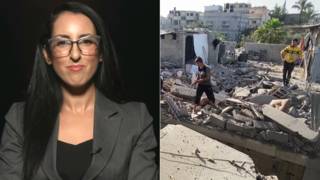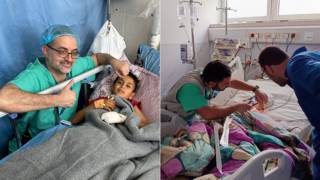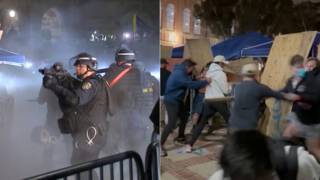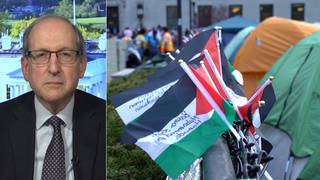
Related
A pivotal but largely overlooked event in US history, millions of African Americans from the South migrated North during the period of the Great Migration, which began in the 1910s and continued to the 1970s.
Award-winning journalist and professor Isabel Wilkerson has spent the last decade researching why so many African Americans decided to leave the towns and farms of the South on such a large scale for her new book, The Warmth of Other Suns: The Epic Story of America’s Great Migration.
This is Part II of the interview.
AMY GOODMAN: We go to part two now with our interview with Isabel Wilkerson, the Pulitzer Prize-winning journalist, author. Her epic work is called The Warmth of Other Suns: The Epic Story of America’s Great Migration
, truly a remarkable work. She has spent fifteen years writing it, but it’s even wrong to say that, because she grew up in it. She comes from the Great Migration. Her parents came south to north.
Put this in context.
ISABEL WILKERSON: The context is that we had one of the largest internal migrations that has ever occurred within the borders of this country, occurred throughout much of the twentieth century. And in some ways, the people left for the same reasons that anyone has ever crossed the Atlantic and steered across the Pacific Ocean or crossed the Rio Grande, seeking a better life for themselves and their family. And one of my goals was to make it come alive so that people could realize that they came for, in some ways, the same reasons as anyone else.
One of the great tragedies of the twentieth century, to me, after having spent so much time studying it, is the people who came from all these different places to these big industrial anonymous cities in the twentieth century, mid-twentieth century, the Industrial Age — they were essentially the same people. And I don’t think people see it that way. And it was my hope that people would. That is, that they were all people coming from the land, often from repressive situations or regimes, looking for something better, maybe not even for themselves but for their children, because it was in some ways maybe too late for them. They had already lived under whatever the situations, the caste system, that they were leaving. But maybe it would be better for their children. And one of the greatest tragedies is that once they got to this country, the economic and structural system under which they were all laboring, working in the slaughterhouses and the factories and the steel mills, meant that certain people were permitted to join unions, and others were actually brought in as strike breakers. Many of the African Americans were brought in as strike breakers. They had no experience with the idea of unionization at all. They hadn’t — the idea of unions were not even imaginable in the South, so they didn’t even know what they were entering. And so, there was this wedge that was created with the arrival of all these people who, had they had the opportunity to get to know one another, would have found that they had so much in common — the lovely — you know, the bringing of the folkways together, the bringing of the food together, the bringing of — the longing for the homeland and the mother country, and missing kinfolk from back home. And all of them were experiencing the same thing — the alienation in the big cities. They were divided when it came to where they could live. They were divided once they got to the workplace. And it’s just so sad to me that this was a rendering asunder of these groups of people who actually were quite the same.
And it would be my goal that people would get a chance to see what was it like to have to make this decision. If you’re in a repressive situation, how do you make the decision to leave? How do you make the decision to try someplace new that you’ve never been before? Maybe you’ve heard about it, a great-uncle has heard about it. This is the background of almost every American. How did we all get here as Americans in general? How many of us know of someone whose great-great-grandmother came in from Ireland and great-grandfather came from Italy, and there you have an entire new lineage born in the New World? I mean, that is essentially what the people here were doing. And it’s my hope that people can recognize and see, through the experiences of these people, these beautiful, amazing people, courageous people, how much we have in common, how we have so much more in common than we’ve been led to believe.
AMY GOODMAN: Certainly in the immigration debate, that would apply, because I think African Americans and immigrants from other countries, there has been some tension, because African Americans have been here for so long, and the issue of “Is someone taking my job?” or “Why do they get to come here, and I don’t have a place to live here?” And yet, you describe African Americans, this massive migration of six million people, as actually immigrants in their own country.
ISABEL WILKERSON: Immigrants in their own country. “Emigrants” with an “E” I’d say, because they were actually leaving one place for another place that they hoped would be better. But I would hope that once you look at the experiences of people who did this, we all have people in our backgrounds who have done this, and we all — all Americans — owe our very existence to someone who did this in our background. It would be my goal that people would stop what they’re doing after reading this book and find the oldest person in their family to be able to hear this story before it was too late. I felt this great urgency in doing that and have realized that we have so much more in common. How wonderful would it be if we could see that this was actually a human experience that we all share?
AMY GOODMAN: The Middle Passage and how this fits, the —- how African Americans ended up in the South?
ISABEL WILKERSON: How they ended up in the South -—
AMY GOODMAN: Go back in time, because you’re talking about 1915 to the 1970s. Now, '15, you have not just descendants of slaves, you have freed slaves themselves.
ISABEL WILKERSON: You do, and you have the grandchildren of slaves. I mean, essentially this was a young — migration is a young person's journey, really, in many respects, because they’re leaving while there’s still time to make a life for themselves someplace else. But the idea of this is that the people who are participating in this wanted the same things as anyone else. It just was unrecognized at the time that it was going on.
And my goal is especially because of where we happen to be right now. We are still living with the effects of what happened during that twentieth century migration. We’re living with the effects of the response to that migration. The geographic divisions within each of these cities is essentially not the migration itself, but it was the reaction. It was the response to the migration in all of these cities. And we’re still living with it now. The fact that we have different separate fiefdoms, in some ways, for each of the different groups is all a reaction to a misunderstanding, a misunderstanding that we all have gone through the same experience and we’re not understanding one another. And this is to look at it from a perspective of, if we can see that we all have this shared common experience, is there some hope to somehow cut through what we’ve experienced. The thing is, at that time, it could be said it was a lost opportunity. Now, there’s an opportunity to make up for that by recognizing how much we all share. I would hope that anyone who reads this could find — could imagine what some forbearer in their lifetime, in their lifespan, in their history, might have experienced.
AMY GOODMAN: How did the South change? We’ve talked about how the North — I mean, it swelled by millions. But the South also lost people with enormous talent who felt there was no place for them there.
ISABEL WILKERSON: The South lost some of its most ambitious and determined people. By definition, someone who leaves one place, the only place they’ve ever known, for a place they’ve never seen, any immigrant has got to have some special kind of resolve and determination that makes them different from those who stay. So, clearly they lost — they lost, first of all, half the workforce. And then they lost a certain kind of person, which has an impact on the South now. I mean, the South currently lags when it comes to educational achievement. It lags when it comes to the Fortune 500 companies and economics. It lags when it comes to many health statistics for the people who are still there. It lags when it comes to property value. So it’s still lagging the North and the West in many, many respects. It’s still living with it. The beautiful part about living history is that we are still experiencing the effects of something that happened just not that long ago.
AMY GOODMAN: The Warmth of Other Suns is taken from Richard Wright. Richard Wright, also one of those who came north. As you —-
ISABEL WILKERSON: 'Til he left the country.
AMY GOODMAN: Because of racism, right?
ISABEL WILKERSON: Exactly.
AMY GOODMAN: As you took these journeys and took the journey yourself with your parents, and talked to so many people, lights must have gone off in their eyes that you are putting this all together, because it's the experience of millions.
ISABEL WILKERSON: Well, you know, when I was first going out, they didn’t realize that they were a part of this big wave. It was -— any immigration experience in our — at a certain point I was reading a book a day, so I was reading a lot about migration. Every time I hear the word “migration,” I just light up. I just love the idea of humans taking something into their own hands. These people did not view themselves as part of some big wave. They viewed themselves as making a personal decision that was best for them under the circumstances, because they were not going to tolerate and could not tolerate the circumstances of Jim Crow and the caste system they were born into.
And so, it’s — I find it so inspiring, because these were individual decisions. They were actually defying their leadership. Their leadership was telling them not to go. The leadership was telling them — Frederick Douglass and Booker T. Washington were saying, “Don’t leave.” Ministers were saying, “Stay here. This is the land of the forefathers.” And they left anyway. I mean, it’s so inspiring to think that you can follow your heart and follow your heart’s desire to do something that you think ultimately is better for you. And it means that we don’t have to necessarily be looking for a savior, which is what many repressed groups often feel that they can’t move forward without that. My view is that if these people, with so little, so few in the way of resources, so little money, nothing but determination and this dream, could act upon that dream, then it seems that there’s so much more that we should be doing with this. We’ve been bequeathed an amazing legacy as Americans as a whole. And I feel as if we should learn something from that.
AMY GOODMAN: How did it change politics in this country?
ISABEL WILKERSON: Well, it changed politics in that most of the cities, which were then — became populated by African Americans, became solid blocs of Democratic voting. I mean, ultimately, they — the entire — there are many cities that you can pretty much, in some ways, know how the voting is going to go, because that’s where the people went. They had a — you have a critical mass of African Americans who are living in certain cities.
Another thing is that these people ended up becoming — even though they were the outcasts of the cities that they went to, it was they who became the first African American mayors in all of these major cities. It was astounding to think that they could arrive as poor sharecroppers and that their children would become the first black mayors of these cities, within a generation.
AMY GOODMAN: Like?
ISABEL WILKERSON: It was astounding. Well, like Tom Bradley in Los Angeles. I mean, his family had actually — he had, as a child, picked cotton in Texas. I mean, that’s astounding. Coleman Young in Detroit and David Dinkins in New York. I mean —-
AMY GOODMAN: Harold Washington?
ISABEL WILKERSON: Harold Washington, of course, in Chicago. All these people were children of the South who went on to the highest levels in the respective cities that had rejected their own people. And so, it was not the Northern-born blacks who were there already or the Caribbean blacks -— not to say that they could not have done it, but just so happens that in all of these cities, they ended up rising within one generation. And that gets to a part of the migration, a part of the African American experience in the North and West, that very rarely gets written about. That is, these people were extremely ambitious, ambitious within the confines that they could be. They really were, and it shows in the rise of these people. Whatever you think of how well they did as mayors, they rose to positions that would never have been predicted when they were born.
AMY GOODMAN: Isabel Wilkerson, you write about Ida Mae Gladney, who, in 1937, left sharecropping and prejudice in Mississippi, in Chicago. You went back with her?
ISABEL WILKERSON: I went back with her. I did. I went back with her. We retraced the steps. We looked for some of the places where she had lived. Of course, it was so rural that, you know, one broken-down cabin could — we couldn’t tell whether that was where her mother lived or not. And we ended up actually driving down one road, and all this cotton was out there growing. She had hated picking cotton when she was a sharecropper’s wife, absolutely hated it. But for whatever reason, we got to this cotton field, and she wanted to stop the car and go out and start picking. And I said, “Are you sure we can do this? I mean, this field belongs to somebody.” I mean — and we’re in Mississippi. And she said, “Oh, they’re not going to care what little bit we pick.” And so, we actually jumped out of the car. It’s almost as if, because she didn’t have to pick anymore, she couldn’t wait to get out there. And we had this bouquet of cotton at the end of the day.
AMY GOODMAN: So then, talk about what happened in her later life, and then, well, voting for Barack Obama — meeting Barack Obama.
ISABEL WILKERSON: Yeah, she — her neighborhood, like so many neighborhoods, ended up kind of falling apart around her. She was one of the first African American families to move into this neighborhood. It emptied out within months. And it left her feeling very sad and bereft. The bakery turned into a liquor store. I mean, it just was a very sad situation. So she used to go to all of these community meetings where they were trying to make things better. And at one of the community meetings around 1996, a man comes in. He’s the new state senator for her district, which is the South Shore section of Chicago. And he comes in, and he’s very professorial. He’s a slightly built, very tall man. He looks like a college student himself.
AMY GOODMAN: Walks in alone.
ISABEL WILKERSON: Walks in alone. He doesn’t have a big entourage. He makes a statement to the people. The people are — you know, they listen very politely. They’re always very polite. And as it turned out, the man who had just come to see them was the man who would become the first black president of the United States. And —-
AMY GOODMAN: And then you -—
ISABEL WILKERSON: She had the chance to be one of the first people to vote for him, because he was the state senator for her part of Chicago.
AMY GOODMAN: And then you have the Obamas themselves. You have President Obama, Barack Obama. White mother.
ISABEL WILKERSON: Mm-hmm.
AMY GOODMAN: African father from Kenya. But Michelle Obama is different.
ISABEL WILKERSON: Yeah, she’s different. She’s a product of this Great Migration from two different streams. I mean, the almost seemingly accidental nature of two different streams coming together and then producing down the line someone like Michelle Obama shows you the magnitude of this migration.
AMY GOODMAN: Michelle LaVaughn Robinson Obama.
ISABEL WILKERSON: Yes, absolutely.
AMY GOODMAN: Her grandfather came from South Carolina?
ISABEL WILKERSON: From South Carolina. And her grandfather on the other side had come from Alabama. And so, they all merged, and these two streams merged in Chicago. And, you know, her mother and her father, who had both been born in Chicago, met, and here you have First Lady of the United States.
AMY GOODMAN: She is the descendant of slaves.
ISABEL WILKERSON: Yes.
AMY GOODMAN: How does the story of slaves fit in to shape the Great Migration?
ISABEL WILKERSON: Slavery fits in with the Great Migration because these were the grandchildren, primarily, of slaves who were part of this Great Migration. They had — after slavery ended, there was this great effort by the South to greatly constrict what black people could do there. That was where the rules that we were talking about, the caste system, developed as a result of that. Jim Crow laws began to go into existence in 1896 and continued and actually tightened the vise in those years. And it was because of the tightening of that vise that many African Americans made this decision to leave, because each year more rules and laws were being created, rules as to whether a black person could — a black person couldn’t even pass a white person on the street in driving, driving a car. There are so many examples of what black people couldn’t do.
Bill Russell, who went on to become the great NBA player, his father was living in Monroe, Louisiana. He went to a gas station. He was waiting and waiting and waiting. One of the rules of Jim Crow was that any black person had to wait for any white person to be served before they could get served themselves. He was waiting for so long that he decided, “I think I’ll back out,” because there were so many white people who were coming after him, white motorists. As he was backing out, the owner of the gas station came over to him with a shotgun and said, “You’ll leave when I say you can leave. Don’t ever let me see you do that again.” So that meant he was forced to stay for as long as it took until the last white motorist had been served, and then he would be served, because he was breaching the caste system that ruled their lives. And that was one of the reasons that his family left. Had his family not left, he would never have been able to go to NCAA basketball college. He would never have been able to lead his team, the University of San Francisco Dons, to two NCAA championships and then go on to the Celtics, which he led to eleven games — eleven championship games — wins. And so, the magnitude goes on and on, depending on where you look. It’s massive.
AMY GOODMAN: We’re going to leave it there, because it’s too massive to keep going, or we’ll be going all night. But the book is called The Warmth of Other Suns: The Epic Story of America’s Great Migration, and it’s by the Pulitzer Prize-winning journalist, author, Isabel Wilkerson. She’s now a professor of journalism at Boston University and lives in Atlanta and in Boston, goes south to north to south to north. Thanks so much.
ISABEL WILKERSON: Thank you for having me.










Media Options